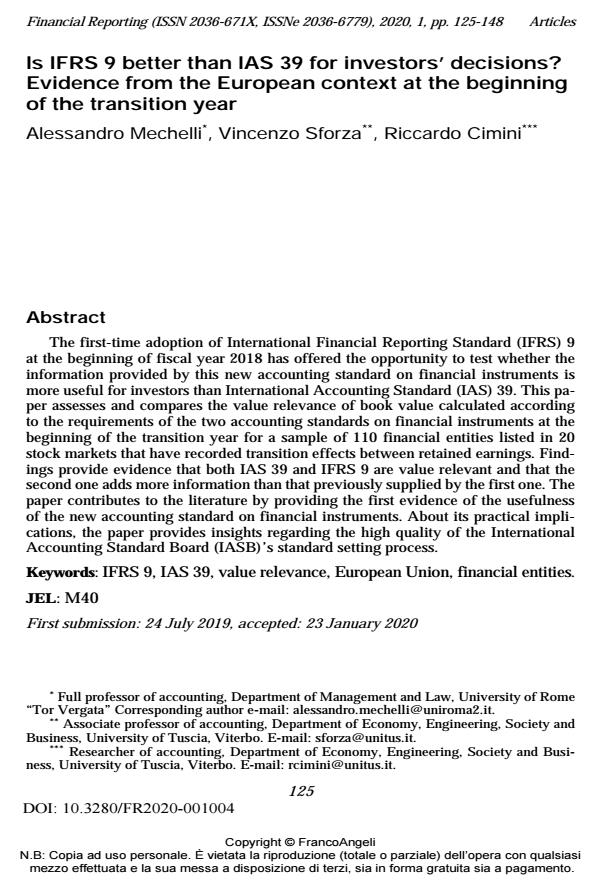Is IFRS 9 better than IAS 39 for investors’ decisions? Evidence from the European context at the beginning of the transition year
Titolo Rivista FINANCIAL REPORTING
Autori/Curatori Alessandro Mechelli, Vincenzo Sforza, Riccardo Cimini
Anno di pubblicazione 2020 Fascicolo 2020/1
Lingua Inglese Numero pagine 24 P. 125-148 Dimensione file 159 KB
DOI 10.3280/FR2020-001004
Il DOI è il codice a barre della proprietà intellettuale: per saperne di più
clicca qui
Qui sotto puoi vedere in anteprima la prima pagina di questo articolo.
Se questo articolo ti interessa, lo puoi acquistare (e scaricare in formato pdf) seguendo le facili indicazioni per acquistare il download credit. Acquista Download Credits per scaricare questo Articolo in formato PDF

FrancoAngeli è membro della Publishers International Linking Association, Inc (PILA), associazione indipendente e non profit per facilitare (attraverso i servizi tecnologici implementati da CrossRef.org) l’accesso degli studiosi ai contenuti digitali nelle pubblicazioni professionali e scientifiche.
The first-time adoption of International Financial Reporting Standard (IFRS) 9 at the beginning of fiscal year 2018 has offered the opportunity to test whether the information provided by this new accounting standard on financial instruments is more useful for investors than International Accounting Standard (IAS) 39. This paper assesses and compares the value relevance of book value calculated ac-cording to the requirements of the two accounting standards on financial instru-ments at the beginning of the transition year for a sample of 110 financial entities listed in 20 stock markets that have recorded transition effects between retained earnings. Findings provide evidence that both IAS 39 and IFRS 9 are value rele-vant and that the second one adds more information than that previously supplied by the first one. The paper contributes to the literature by providing the first evi-dence of the usefulness of the new accounting standard on financial instruments. About its practical implications, the paper provides insights regarding the high quality of the International Accounting Standard Board (IASB)’s standard setting process.
Parole chiave:IFRS 9, IAS 39, value relevance, European Union, financial entities.
Jel codes:M40
- PROBLEMS OF CLASSIFICATION AND VALUATION OF FINANCIAL ASSETS V. Quliyev, in Financial and credit activity problems of theory and practice /2022 pp.162
DOI: 10.55643/fcaptp.1.42.2022.3678 - Value Relevance Research in Accounting and Reporting Domains: A Bibliometric Analysis Giuseppe Nicolò, Serena Santis, Alberto Incollingo, Paolo Tartaglia Polcini, in Accounting in Europe /2024 pp.176
DOI: 10.1080/17449480.2023.2292654 - What drives discretionary loan loss provisions? The role of banks' business model, listing status and COVID-19 crisis in the European banking sector Alessandra Allini, Fiorenza Meucci, Flavio Spagnuolo, Annamaria Zampella, in FINANCIAL REPORTING 2/2023 pp.71
DOI: 10.3280/FR2023-002003 - The informational relevance of IFRS 9 adoption: emerging market evidence Daniel Taylor, Isaac S. Awuye, Eunice Yaa Cudjoe, Francois Aubert, in Journal of Accounting Literature /2025
DOI: 10.1108/JAL-06-2024-0127 - Value relevance of IFRS 9: The influence of country factors and heterogeneous strengths in the European banking sector Annamaria Zampella, Luca Ferri, in Journal of International Financial Management & Accounting /2024 pp.115
DOI: 10.1111/jifm.12193 - Equity financial instruments: use, determinants and usefulness from IAS 39 to IFRS 9 Zeting Zang, Humayun Kabir, Tom Scott, in Meditari Accountancy Research /2025 pp.417
DOI: 10.1108/MEDAR-03-2025-2930 - Expected credit losses and managerial discretion. Current practices and future challenges Riccardo Macchioni, Alessandra Allini, Martina Prisco, in MANAGEMENT CONTROL 3/2021 pp.111
DOI: 10.3280/MACO2021-003006
Alessandro Mechelli, Vincenzo Sforza, Riccardo Cimini, Is IFRS 9 better than IAS 39 for investors’ decisions? Evidence from the European context at the beginning of the transition year in "FINANCIAL REPORTING" 1/2020, pp 125-148, DOI: 10.3280/FR2020-001004